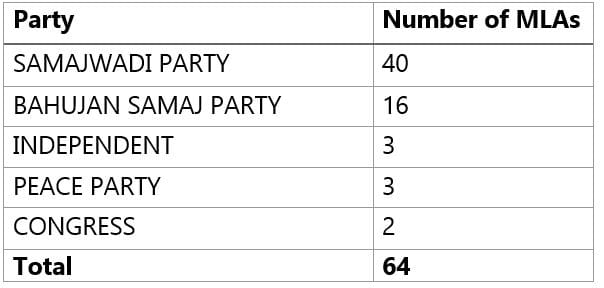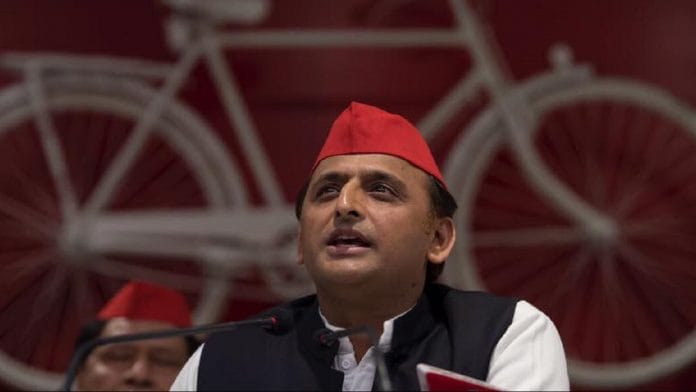India’s national parties have fielded very few Muslim candidates in this Lok Sabha election, while the regional parties are equally apprehensive to rely on their Muslim leaders. It appears that the country’s political class has accepted the Bharatiya Janata Party’s position that Muslims candidates cannot win elections on their own; hence giving them tickets goes against the doctrine of winnability.
Does it mean that Muslim leaders have become a liability for all political parties? Is it not a symbol of political apathy and communal discrimination? Does it affect Muslim voters?
After all, Muslim backwardness is a national issue, it isn’t just a Muslim community issue. It is true that the Muslim community wants their issues to be raised and heard, but not just by the Muslim poster-boys (and women) of different political parties. This questions the prevalent premise of substantial representation and optical presence.
To understand the position that Muslim candidates hold in today’s politics, one must unpack the imagined relationship between Muslim MPs and Muslim masses. It is assumed that if an opportunity is given to Muslim voters, they will eventually vote for a Muslim candidate at the constituency level. The elected Muslim representatives, in this framework, are expected to raise the specific Muslim concerns in the legislative bodies. By this logic, an organic link between Muslim leaders and Muslim masses is always established.
Also read: 17th Lok Sabha looks set to confirm Ambedkar’s fears: no vocal Dalits in Parliament
Elected Muslims versus Muslim voters
The highly idealised imagination of Muslim political homogeneity does not exist at the ground level. Muslim elected representatives do not necessarily work for the interest of Muslims. Let us take the example of anti-Muslim violence in Muzaffarnagar, Uttar Pradesh, to elaborate this point.
The Muzaffarnagar riot of September 2013 is considered to be one of the most horrible communal disturbances in post-colonial India. Around 50 people, mostly Muslims, were killed in these riots and many thousands were displaced.
The Samajawadi Party, which had won the UP assembly election in 2012 with a sizable majority, was in power at the time of violence. Known for its pro-Muslim attitude, the Samajwadi Party had 40 Muslim MLAs in the state assembly (out of total 64 Muslim MLAs). It means the Muslim representation in the assembly was around 15 per cent. (There were 27.15 per cent Muslims in UP according to 2011 census of India).
Table 1: Muslim MLAs in UP assembly (2012)

The political configuration of the Muzaffarnagar district was also very interesting. The district was well represented either by Muslim MLAs/MP or by those parties that claim to be secular. In fact, the BJP had only one MLA from the Muzaffarnagar area.
Table 2: Political configuration of Muzaffarnagar district 2012-14

These Muslim MLAs, as well as the other non-BJP leaders, had won the 2012 assembly elections very comfortably. Data from the Election Commission show that all of them secured more than 30 per cent votes, which means they had a significant mass base in their respective constituencies. By all electoral standards, Muslim representation in the UP assembly in general and Muzaffarnagar in particular, was remarkably impressive.
If this is the case, then the question arises: why did these elected representatives fail to act effectively during and after the riots?
Party line versus Muslim interests
The failure of political efficacy in UP illustrates an important aspect of our political system. Muslim MLAs and Muslim MP of Muzaffarnagar did not claim to represent the riot-effected Muslims of the district. Nor did they campaign for any kind of counter mobilisation of Muslim electorates in later elections. On the contrary, they continued to follow the instructions given to them by their respective political parties.
Also read: Muslims of West Bengal are no longer Mamata Banerjee fans but they have no real option
UP assembly debates also confirmed this observation. Muslim MLAs of the Samajwadi Party always adhered to the arguments made by the senior party leaders such as Akhilesh Yadav and Mulayam Singh Yadav. In fact, they did not officially participate in relief and rehabilitation works in the riot-affected areas (though many of them contributed to the relief projects led by the Jamiat-Ulama-e-Hind).
It simply means that Muslim MPs and MLAs behave like professional politicians in legislative bodies. Therefore, establishing direct correlation between the number of MPs in Lok Sabha and Muslim marginalisation is not entirely appropriate.
Presence versus representation
Does it mean that Muslim representation in Lok Sabha is completely irrelevant?
The highly competitive nature of Lok Sabha elections in recent years has forced the political parties to deviate significantly from the principle of social inclusion. The parties do not want to take risk and hence concentrate entirely on the winnability factor at the constituency level.
However, it does not mean that there is no scope for Muslim leaders to get placed in the power structure of state-system. All political parties, including the BJP, accommodate Muslim leaders through different routes — the Rajya Sabha, Wakf Board, the National Commission for Minorities and so on.
Also read: Bengali Muslims are not sure where they belong this Lok Sabha election
This oblique Muslim presence in state-system should not be confused with Muslim representation. The Muslim leaders are kept in the parties as ‘good Muslims’, and they are expected to propagate the party’s position on Muslim specific issues.
This is precisely what Muslim leaders of the BJP argue these days. They happily justify their presence in the BJP by highlighting the fact that they do not ask for a ticket to fight elections.
Muslim presence in state-system shouldn’t be exaggerated to make a judgment on the everyday issues, problems and anxieties of poor and marginalised Muslims. After all, Muslim backwardness is a national issue, which is a more serious problem than the declining number of Muslim MPs in the next Lok Sabha.
The author is a scholar of political Islam and associate professor at Centre for the Study of Developing Societies. Views are personal.
This article is part of a series by the author on the 2019 Lok Sabha elections and how Muslims vote. Read the others here.







Infact the Secular parties have failed Muslims since independence…. Not only Muzaffarpur riots even lynching of Akhlaq has been politicised by Secular parties in order to gain Muslims sympathy due to incoming State elections…. Why did not Akhilesh Govt took stern action against the perpetrators of lynching and later in Muzaffarnagar riots….???? Who stopped him….??? It’s better not to talk about Khongress on the Muslims conditions…. The main responsibility of the conditions of Muslims in India lies with the grand old party….??? Khongress has never tried to literate the people of this country since independence whether Hindus or Muslims…??? That’s the biggest failure of Nehru and it’s successive generations ruled over India….??? TADA was enacted by Khongress when there was no terrorism in India and blatantly misused against Muslims in Maharashtra and Gujarat by the then Khongress Govts….??? Later on Khongress took the credit of abolishing TADA when terrorism reached its nadir in India….?? NDA enacted POTA when terrorism was at its peak in the world… But Khongress again took credit of abolishing POTA during UPA when terrorism was flourishing in the world….??? Country after country enacting stricter laws to the growing menace of terrorism world over in order to protect their boundaries…. And in all this nonsense approach of Khongress over the years, the media has also playing along…. No Secular media questions Khongress Govts that why they could not literate people of this country even after continuous rule of 50 years since independence….???? Why health services were not provided at the village level for first 50 years….??? Why the basic necessities like electricity was not provided to all since independence….???? Secular media never questioned Khongress of its follies….?? But put every question to Modi BJP Govt who took power in May 2014 only…. Everybody remember six years rule of Atal Bihari Vajpayee till date…. But nobody remember or want to remember 10 years of Economist PM’s rule even after some of the failing of the Modi Govt such as Cow Vigilantes…. Because everyone wants to secure Muslims’ vote only….. Nothing else….. Only Muslims ‘ vote…
Why it’s expected that Muslim MPs MLAs work for Muslims only…. The same thought divide the society at large….. Why not the elected representatives work for the people of his constituency in a holistic way…. The problem is Secular parties behave in India as a Patent on Muslims…. And want to instill fear psychosis into the minds of Muslims against Right Wing Hindus…. Some of the Muslims want to join right wing party but the fear of boycotting by Muslims don’t allow them to join…. Recently Shazia Ilmi tweeted that she has not been allowed to enter and speak in India Islamic Cultural Centre, New Delhi because she is a member of Right Wing political party…. What type of Secularism is this…? Where is Freedom of speech and it Liberads Selective Leftist Lutyens supporters….??? It’s only expected from Hindus to be Secular…..???? Who will teach Muslims, it’s leaders, it’s clergy, it’s institutions to be Secular….???